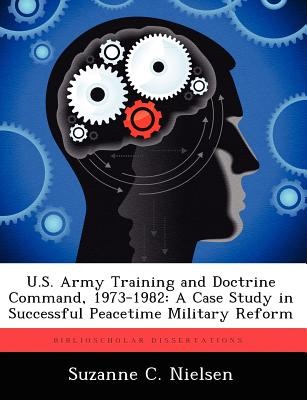
- We will send in 10–14 business days.
- Author: Suzanne C Nielsen
- Publisher: BiblioScholar
- ISBN-10: 1249428076
- ISBN-13: 9781249428077
- Format: 18.9 x 24.6 x 0.8 cm, softcover
- Language: English
- SAVE -10% with code: EXTRA
U.S. Army Training and Doctrine Command, 1973-1982 (e-book) (used book) | bookbook.eu
Reviews
Description
In the 1970s, the newly formed Training and Doctrine Command (TRADOC) played a key role in instituting and integrating peacetime military reforms. TRADOC updated doctrine, revised training practices, and ensured that these and other aspects of the combat developments process were mutually supportive. TRADOC changed the manner in which the U.S. Army prepared for war.
That TRADOC played such a central role is important because a common expectation is that military organizations will be unable to reform themselves. This perspective is deficient in that it fails to predict the changes that Generals William DePuy, Donn Starry, and Paul Gorman spearheaded in the 1970s and early 1980s. The Army faced external pressures--changing national security policy, budget stringency, and the political decision to move to an all-volunteer force--but these challenges and constraints did not provide Army leaders with a detailed plan of action. The shape and extent of reforms within the U.S. Army in the 1970s were primarily determined by leaders from within the organization.
This thesis explains the role of TRADOC in the Army's reforms in the 1970s and draws implications relevant to today's Army Transformation.
EXTRA 10 % discount with code: EXTRA
The promotion ends in 16d.21:59:01
The discount code is valid when purchasing from 10 €. Discounts do not stack.
- Author: Suzanne C Nielsen
- Publisher: BiblioScholar
- ISBN-10: 1249428076
- ISBN-13: 9781249428077
- Format: 18.9 x 24.6 x 0.8 cm, softcover
- Language: English English
In the 1970s, the newly formed Training and Doctrine Command (TRADOC) played a key role in instituting and integrating peacetime military reforms. TRADOC updated doctrine, revised training practices, and ensured that these and other aspects of the combat developments process were mutually supportive. TRADOC changed the manner in which the U.S. Army prepared for war.
That TRADOC played such a central role is important because a common expectation is that military organizations will be unable to reform themselves. This perspective is deficient in that it fails to predict the changes that Generals William DePuy, Donn Starry, and Paul Gorman spearheaded in the 1970s and early 1980s. The Army faced external pressures--changing national security policy, budget stringency, and the political decision to move to an all-volunteer force--but these challenges and constraints did not provide Army leaders with a detailed plan of action. The shape and extent of reforms within the U.S. Army in the 1970s were primarily determined by leaders from within the organization.
This thesis explains the role of TRADOC in the Army's reforms in the 1970s and draws implications relevant to today's Army Transformation.


Reviews